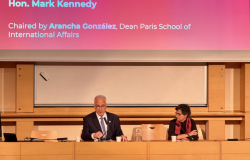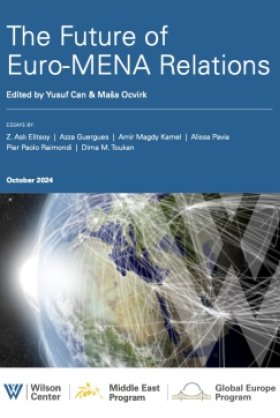246. Is There a Future for Federalism in the Balkans?
Ladies and Gentlemen, Colleagues, Friends,
There is much symbolism in the fact that I am talking today and here, at the Woodrow Wilson Center, about federalism, one so typically American, and, largely thanks to President Wilson, typically Yugoslav issue. When I say a typical Yugoslav issue, I think of the fact that it was of critical importance for the first, the second and the third Yugoslavia alike. It was the federal system or its insufficiently consistent implementation that tormented and eventually broke down the first and the second Yugoslavia. The third one, which we live in today, or more precisely, on whose ruins we live today, has also failed to produce an adequate solution for this issue. Therefore, we are trying with a vengeance to identify a good federal formula, quite new in many aspects, so that it could serve as a framework for a fourth, sustainable Yugoslavia, or, if you like, a newly established community of Serbia and Montenegro.
There is some symbolism on yet another plane: Woodrow Wilson is linked with American interventionism, a change to the Monroe Doctrine, a collective security system to deter aggression, the Paris Peace Conference, at which Yugoslavia was created, the League of Nations, faith in the possibility of making a proper settlement that would satisfy the legitimate rights of warring sides, "peace without victory," as he would put it. It is hardly possible to mention all good things that Wilson's policy gave to the world but it is also almost impossible to list everything bad, which his New Freedom policy could and did twist into. Henry Kissinger says that the collapse of the Soviet empire and Communism proved the moral and practical advantages of the democratic ideal, but it also turned out that it is not at all simple to attain that ideal in today's, post-communist world. Efforts aimed at the promotion of democracy, such was Wilson's appeal to America to go ahead in its search for democracy, can undeniably produce deeds of enormous creativity. This has proved to be true in practice, too. However, it also turned out that it can turn into its opposite. A cure may be worse than a disease.
Strangely enough, both have reflected in the Balkans, on the Yugoslav soil. First, the state was created on the basis of the Treaty of Versailles, largely resting on the right of the peoples of failed empires to self-determination, a principle Wilson had cherished. It could be said that the first Yugoslavia was in fact the result of a consensus between the great powers and the Yugoslav peoples, be it for quite the opposite reasons or not. When the second Yugoslavia began to sway on the wave of the collapse of communism, the ugly face of interventionism loomed. We know that the blame for civil wars on the soil of former Yugoslavia rests with local power-wielders, who in a bid to keep their feuds at any cost portrayed themselves as the advocates of national interests. They, however, would have never dared accomplish their plans hadn't they been given the green light for the disintegration of the state.
When I spoke here, at this very Center, more than fifteen years ago, as a scientist and one of already numerous fighters for human rights and freedoms in the authoritarian Yugoslav system, I spoke in favor of federalism and against facade federalism, that is, confederalism that had already eroded the Yugoslav foundations. I also offered an interpretation of federalism, which was indeed hard to contest in political and legal theory. This explanation was in no way a defence of federalism, let alone its apology. Quite the contrary, a view was put forward and substantiated that made the value of federalism relative rather than absolute. In other words, the validity of a federal solution is to be judged on a case-by-case basis. I pointed out that in the Yugoslav case in point, the history of national relations in Yugoslavia might speak against the federal solution, even though that same history could be also in favour of a federal system in Yugoslavia. If anything, this form of a compound state could make it possible for most of the Yugoslav peoples to gather as many of their compatriots as possible under a single state roof. As a matter of fact, it could eliminate the perils of civil war or new dictatorship if the present-day common state collapsed. Even if rising from the ruins of a communist dictatorship, such a form of state system, whatever it may be called, would have to have little in common with old, classical centralised federations and to combine certain confederal elements pertinent to our dilemmas and problems.
Since then, the situation has changed in many aspects, and not only the key reasons for a federal solution have not be exhausted, but gained momentum instead. This is why I still advocate a minimal and functional federation when Serbia and Montenegro are concerned. However, it has to be very special in many ways, because it is composed of two units very different in size and population. One of them, Serbia, should be regionalised at that. In this respect, that common state would be built on the very same principle American federalism rests on - every citizen belongs to two unions - a federal unit and the federation. The federation is not only a set of states it consists of, but also a new, comprehensive union comprising all citizens of all member states. It is both the union of citizens as individuals and a union of member states; it is, in fact, a union of unions. On the other hand, the broader union and the narrower unions are separated and have their own, effective prerogatives of power. Federal units play an important role in the federal government structure. Accordingly, the federation is a genuine guarantor of unity and legal order.
I do not know if some new Madison would point to a combination of different principles in the future constitution of the Serbian-Montenegrin union. Nevertheless, its promulgation will make it a "confederal" constitution, since it is to be approved and ratified by the parliaments of members states, but it is also going to be a federal constitution since the federal parliament will also have to decide upon it. If, hopefully, we decide to keep the bicameral structure, the election of legislative bodies will make it both "national" and "federal" constitution. The former will be expressed in the election of members of the lower house (the Chamber of Citizens), and the latter in the election of members of the upper house (the Chamber of Republics). If you allow me to paraphrase James Madison, "Therefore, strictly speaking, the proposed constitution is neither national nor federal, but rather a combination of both."
In any event, a new constitutional system based on the sovereign will of the citizens of Montenegro and Serbia should give the state union durable and legitimate foundations for their future coexistence. This will establish a federal and democratic union and create viable conditions for the freedoms and rights of citizens to be exercised and national minorities and the equality of both member states protected. The union will rest on the historic statehood tradition of Serbia and Montenegro, centuries-old cultural, political and economic ties between Montenegro and Serbia, their commitment to building a state union on the principles of rule of law, in which basic rights and freedoms will be persistently safeguarded, along with the rights of national and ethnic communities, in which power will be limited by legal principles and rules. It will also rest on the commitment of Montenegro and Serbia to achieving full international affirmation of both the state union and its members through harmonious activity of the union, and thereby an efficient entry into the contemporary regional and European integration processes. The envisaged joint functions include foreign policy, defence, market, monetary system and human rights. Everything else will fall under the jurisdiction of the federal units.
On the political plane, after the January 25 talks between representatives of the federation, Serbia and Montenegro, also attended by EU High Representative for Common Foreign and Security Policy Javier Solana, things have assumed a more definite shape. First of all, a precise timeframe has been set - the end of February. The topic permeating all the talks, both expert and political, is: the preservation of the federation and its restructuring within the European framework and in accordance with European democratic standards. This has been confirmed at a meeting of the EU Council of Ministers, whose conclusions are dominated by two major points of view: first, the survival of the common federal state is the best and quickest way of joining the European integration processes, and secondly, a strict warning was issued against unilateral moves, those that could hinder the ongoing dialogue in particular.
Having in mind two main features of the policy pursued by the Montenegrin authorities, independence and a referendum, announced to be held at the end of April or at the beginning of May, the latest conclusions by the EU Council of Ministers made it perfectly clear that the European Union was against such a policy. This is of vital importance for us, since it has turned out that despite Montenegro's bid to block the search for a solution for more than a year now, we have not wasted our time, but have worked patiently and carefully on the salvation of the common state, bearing in mind the interests of the Serbian and Montenegrin citizens, as well as the common interest of accession to Europe. More importantly, perhaps, the general feeling in Montenegro has begun to shift towards the common state, while the acceptability of the policy of independence has dropped comparatively, which the latest opinion polls in the republic has testified to. Slowly but surely, it turns out that we have invested in the key project - the preservation and reconstruction of the common state - and that this is an investment into a future without further divisions in the Balkans, in favour of peace and the common future.
Anyway, I believe that we have not only taken the right path towards the proper restructuring of the common state of Montenegro and Serbia, but that we are a heartbeat away from achieving the ultimate goal. I believe that we will soon be able to present a new constitution the way Tench Coxe did:
"...There is no spirit of arrogance in the new federal constitution. It addresses you with becoming modesty, admitting that it may contain errors. Let us give it a trial; and when experience has taught its mistakes, the people, whom it preserves absolutely all powerful, can reform and amend them." Just like that, we could set a deadline, say, five years, within which we are going to do that. I am confident that it is enough time for the citizens, in Montenegro in the first place, to reconsider their positions and see if that state meets their genuine needs.
Let me use the words of one of the old Republicans, John Dickinson Fabius: both Serbia and Montenegro today need to overcome "overweening selfishness by benevolence, if successful free government is to be established." As in every civil society, an individual will have to waive some of his rights to ensure others. "Herein there is a progression, not a contradiction. As man, he becomes a citizen; as a citizen, he becomes a federalist."
Ladies and Gentlemen,
In 1991, just before the breakdown of former Yugoslavia, I wrote a few sentences that I often call to mind: "Ever since its establishment, Yugoslavia has been a country of missed opportunities. Is this post-communist society going to miss forever a chance of building on this soil a unique democratic system and political culture which would leave unharmed in their rights the citizens as individuals, national collectivities, political, cultural and historic territorial wholes alike? Is such a system still possible? These are the questions to proceed from in any deliberation about the fate and prospects of the Yugoslav community."
Clearly, these issues are as relevant today as they were at the time. Less as a scientist, because as a scientist I am invariably skeptical, but more as a politician, I am increasingly convinced that the answer to the first question can be negative, while a "yes" to the second is quite likely. Both answers depend heavily on the will, readiness and patience of citizens and political elites in Yugoslavia, but also on the will and support of the leading European and American states. To all appearances, we have managed to win European support. The last but not the least thing to be done is to gain Washington's support. Here I do not think of verbal support only, but a genuine, effective, well-balanced support to the Federal Republic of Yugoslavia, substantiated by action, for the sake of peace and stability in the region at large.
Thank you for your attention.
H.E. Vojislav Kostunica spoke at a Wilson Center Director's Forum on February 6, 2002. The above is the transcript of his speech. Meeting Report #246.
About the Author
H.E. Vojislav Kostunica
Read More
Global Europe Program
The Global Europe Program is focused on Europe’s capabilities, and how it engages on critical global issues. We investigate European approaches to critical global issues. We examine Europe’s relations with Russia and Eurasia, China and the Indo-Pacific, the Middle East and Africa. Our initiatives include “Ukraine in Europe” – an examination of what it will take to make Ukraine’s European future a reality. But we also examine the role of NATO, the European Union and the OSCE, Europe’s energy security, transatlantic trade disputes, and challenges to democracy. The Global Europe Program’s staff, scholars-in-residence, and Global Fellows participate in seminars, policy study groups, and international conferences to provide analytical recommendations to policy makers and the media. Read more











